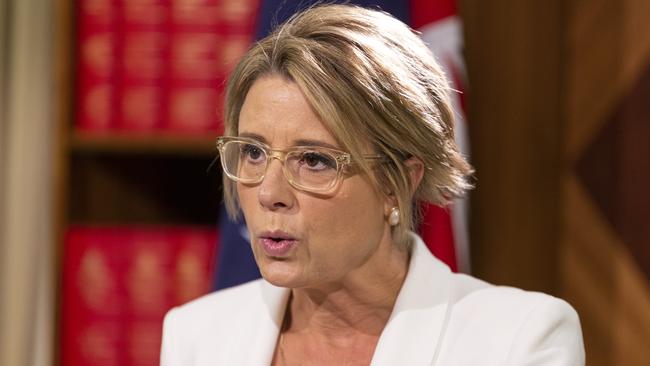Those in power must be held to account when police raid reporters

It is a constant challenge to strike a balance between national security and the openness democracy demands. There has been a raft of national security laws passed by the Australian parliament since the Liberals were first elected in 2013.
The raids on News Corp journalist Annika Smethurst’s home and on the Sydney offices of the ABC pose the question whether we have been getting the balance right, both in our laws and within executive government.
Make no mistake — a government must take seriously the unauthorised disclosure of classified national security information and should investigate it. But that doesn’t preclude legitimate questions being asked about whether a democratically elected government and its agencies should be able to tip open the underwear drawer of a journalist, or to “remove, alter or delete” information from a media organisation’s computer systems.
There are two issues in play here — leadership and legislation. Scott Morrison, Home Affairs Minister Peter Dutton and Attorney-General Christian Porter assert that the referrals, investigations and raids have nothing to do with them. It’s true that police make operational decisions but politicians remain accountable to the public.
When freedom of the press — a basic tenet of our democracy — is seen to be under attack, the government must speak up. When a perception of bias starts to develop around the police, the government must restore that trust.
The perception of bias is a real risk now. Not only is there media apprehension about an attempt to intimidate reporting, there is also a concern that only leaks embarrassing the government merit investigation while those that benefit the government do not.
The decision by the AFP to drop its investigation of a leak of classified ASIO information during the medevac debate has shocked many. ASIO chief Duncan Lewis described this leak as “seriously damaging” and as undermining the work of ASIO to keep Australians safe.
When the leak occurred, Dutton seized on it for political benefit. Last week, Morrison said that “no one is above the law”. It is hard to take the Prime Minister’s words seriously when his own Home Affairs Minister won’t face the media to answer questions about what he and his office know about this damaging leak of classified information.
As for legislation, Labor has been in opposition since 2013. That is not an excuse but rather a fact. Labor can move amendments and has done so but ultimately it is up to the government of the day to take leadership on these issues.
The events of the past week demand that we, as parliamentarians, look with fresh eyes to consider whether the balance has tipped too far, whether laws are being used as intended and, if not, how those laws could be changed.
It also is a question many media outlets will need to face — in their reporting on new laws, did they focus more on the government’s national security agenda than on media freedom? Was proper scrutiny of these laws crowded out by pressure to “keep Australians safe’ at all costs? How can the media help parliament do better to safeguard democratic freedoms within the context of maintaining our national security?
Since the raids took place, News Corp, the Law Council and Seven West have raised the need to review key national security legislation and protect journalists. Labor’s amendments in recent years to national security legislation have sought to achieve this and safeguard freedom of the press. Last year, Labor successfully moved several public interest defences for journalists under the Espionage and Foreign Interference Bill. When the metadata laws were before parliament, Labor insisted that a journalist’s metadata should not be accessed without a warrant.
In light of the damage the government has done to public trust in media freedom through its failed leadership, proposals such as those by News Corp and the Law Council to amend national security laws to protect the media and whistleblowers are a good place to start and deserve serious consideration. Labor also wants other legislative changes considered, such as amendments to the encryption laws passed last year.
Last year the bipartisan Parliamentary Joint Committee on Intelligence and Security recommended a suite of changes but these have been stymied. Labor supports reforming the PJCIS not only to review legislation but also to provide increased oversight of intelligence and security agencies to accompany their increased powers. Reforms such as these were recommended as part of the 2017 Independent Intelligence Review commissioned by the government. Among our Five Eyes partners, Australia is an outlier in not providing oversight such as these.
All of these proposals will require thorough review. The government could ask the PJCIS to do this work. An alternative would be to consider the merits of establishing a new parliamentary joint committee to recommend legislative and other steps to ensure we are getting the balance between national security legislation and freedom of the press.

